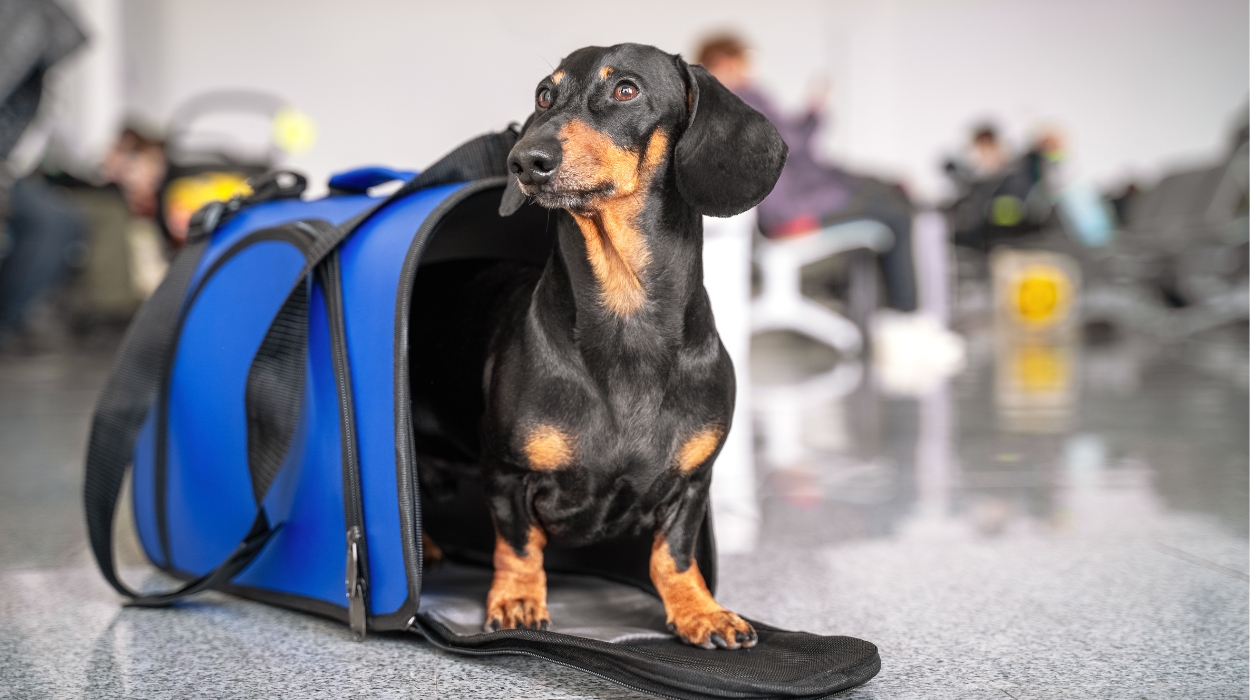 Evidence Based
Evidence Based
Evidence Based
This article is objectively based on relevant scientific literature, written by experienced medical writers, and fact-checked by a team of degreed medical experts.
Our team of registered dietitian nutritionists and licensed medical professionals seek to remain objective and unbiased while preserving the integrity of any scientific debate.
The articles contain evidence-based references from approved scientific sites. The numbers* in parentheses (*1,2,3) will take you to clickable links to our reputable sources.
Emotional Support Animal United Airlines 2024: Flying Policies & Rules

The acceptance of emotional support animals (ESA) on commercial flights has recently been a subject of intense debates and discussions. Most ESA owners expect that they should have the same freedom that service dog owners benefit from.
However, this is not the case, considering service dogs tend to offer more specific tasks relating to improving the quality of life of their owners. Indeed, ESAs also help provide comfort and emotional assistance to the owners.
But they don’t have adequate training and may constitute disturbance and conflict with other passengers. As a result, the creation of policies that limit their chances of travel.
This article discusses everything you need to know about traveling with an emotional support animal United Airlines, including psychiatric service dogs (PSD). Read on.
Emotional Support Animal United Airlines: The Policy
The updated Department of Transportation, DOT[1] guidelines do not accept emotional support animals for air travel. Therefore, ESAs don’t partake in the privilege service animals enjoy.
Consequently, United Airlines has stopped recognizing emotional support animals. The policy puts them as regular pets so that they may attract fees of $125 each way.
However, the airlines allow smaller dogs and non-service animals, provided they can contain a carrier and serve as in-cabin pets. In addition, psychiatric service animal users can board United Airlines flights with their animals without extra fees.
United Airlines Emotional Support Animal Policy

United Airlines emotional support animal rules will only permit non-service animals (pets), including ESAs, as “in-cabin” pets. This includes only dogs and cats in a carrier that will fit just in front of you. Also, you must have made a reservation, designating in-cabin pets beforehand.
Indeed, there are no weight restrictions for the in-cabin pets, but they must easily fit into the soft-sided or hard-sided carriers in front of you. Moreover, the carrier must allow the animal easy turn, sit, and stand with little to no restrictions to movement. They also insist on a single animal to one carrier.
In addition, we recommend that passengers traveling with in-cabin pets check in with United Airlines earlier than the recommended time, say about 30 minutes. During the check-in, you’d get a bright yellow tag to put around the pet’s carrier or kennel.
Regarding the carrier’s dimension, soft-sided carriers should not exceed 18 inches (length) by 11 inches (breadth) by 11 inches (height). Following the exact specifications, hard-sided carriers should be at most 17.5 by 12 by 7.5. Also, remember that you’ll be required to pay a fee of $125.
Emotional Support Animal (ESA) & Service Animal: Differences
The main differences between emotional support animals and service dogs include the training levels and the roles they provide users. The headings below discuss their differences further.
Role
Going by the name, emotional support animals help provide emotional assistance. They provide comfort, companionship, and social support, especially to individuals with mental health conditions. Owners experience reduced stress, loneliness and improved social interaction through cuddling and playing with these animals.
However, a service dog is equipped with training to help individuals with disabilities. They provide support in performing simple tasks.
Function
Providing emotional support, ESAs may help alleviate various emotional disorders, like depression and anxiety. However, service animals help assist, like guiding a visually impaired person, pulling a wheelchair, etc. Service dogs undergo training to help someone with a particular disability. These disabilities can be physical, sensory, or cognitive.
Legal Provision
While service animals have superior rights to those of emotional support animals, the Fair Housing Act[2] allows owners of ESAs to live with their animals in houses with pet restrictions. On the other hand, the American Disabilities Act[3] protects service animal rights. This permits owners to have these animals in public spaces, like train stations, restaurants, airports, and airplanes.
Training
ESAs don’t require extensive training to perform their duties of providing support and alleviating stress. However, simple socialization and obedience training may prove effective in obtaining the best from such animals.
Service animals, though, undergo specialized training depending on the roles they are to perform. The training is tailored to specific disabilities. For example, a service dog for guiding people who are blind will undergo different training from the one intended to alert someone who is deaf.
Emotional Support Animal United Airlines: Conditions
To be eligible for travel with United Airlines, animals and pets must be at least four months old. And you can only fly with dogs and cats; other animals are not permitted. However, this airline has strict restrictions against pit bulls, even if they are service animals.
In addition, passengers with animals having a snub nose, especially French bulldogs and Persian cats, are recommended to consult their veterinarian before traveling. This is because the high altitudes that planes reach may affect their breathing.
Traveling With A Service Dog On United Airlines
Traveling with a service dog (or a psychiatric service dog) requires you to provide certain information regarding the animal by filling out some Department of Transportation forms. The report includes the animal’s weight, breed, vaccination status, etc.
On the United Airlines service animal page, you’d provide certification that the animal has completed the U.S Department of Transportation Air Transportation Service Animal Training Behavior. Also, you’d have to guarantee your animal is well-trained and won’t relieve itself in the airport or on the plane.
In fact, you’d also need to submit a U.S. Department of Transportation Service Animal Relief Attestation form for flights longer than 8 hours. Moreover, you will also give assurance that the animal will always be in your control. And if they want to ease themselves at the airport, you just have to visit the United app to find the appropriate animal relief area.
Unlike most airlines that do not permit service dogs in training to fly, United Airlines will allow them to travel, provided the dog trainer will join in the flight. Also, they must be assisting someone with a disability. You should contact United Airlines directly to understand the precise requirements.
What To Know When Flying With Service Dogs/Non-Service Pets
Before traveling with service dogs or non-service pets, it’s best to understand the airline’s policy. For example, Delta ESA policy may vary from that of United. Therefore, you should consult whichever airline you travel with to know their requirements.
However, the Air Carrier Access Act[4] allows all airlines to travel with your service dog, provided you have legitimate service dog certification. Though some variations may exist for different pets, including ESAs and PSDs, requiring you to pay a pet fee.
Conclusion
Even with guidelines prohibiting ESAs from traveling in airplanes, United Airlines policies make it easier for you to travel with your pets. As much as your dog can conveniently contain an in-cabin carrier, you can travel with them. You must complete the necessary documents for service dogs and have certain completed forms and certificates, including a behavior attestation form.
Frequently Asked Questions
Yes. The US government prohibits flying in animals, including service dogs from countries with high rabies risk. This measure is crucial for maintaining public health and safety and mitigating the spread of rabies. These countries include Brazil, Belize, China, Ghana, South Africa, Jordan, India, Peru, Philippines, El Salvador, etc.
No, United Airlines does not recognize ESAs. They recognize only service dogs and psychiatric service dogs. However, provided your animal can fit into a small carrier and pass as an in-cabin pet, you can travel with them.
Until mid-2020, United Airlines operated “PetSafe” pet transport, allowing pets to travel in the cargo hold. However, this program is now obsolete. Therefore, only service animals, small dogs, and cats that can accommodate the in-cabin carriers are permitted.
ESAs support and assists individuals with emotional and psychological challenges, including during travel. However, since they do not undergo extensive training, they may be a source of potential disturbance to other passengers and crew members during the flight.
The controversies surrounding ESAs include fraudulent claims, as specific individuals don’t have significant emotional difficulties. Also, inadequate training if these animals tend to cause conflict and pose disturbances to other passengers.
The airline’s policy allows service dogs and psychiatric service animals to travel with passengers for free. However, you’d pay a pet fee of $125 per way and $125 for each layover longer than four hours. For more information, you’d have to contact United Airlines for their charges.
When boarding with your service dog or ESA, you must present a veterinary health form. When traveling within the continental U.S., you must get your animal’s health certificate from a registered veterinarian with current proof of rabies vaccination.
Emotional support animals provide support and emotional assistance to individuals with emotional difficulties. Service animals help individuals with disabilities to perform specific tasks, while psychiatric service dogs assist individuals with psychiatric conditions.
+ 4 sources
Health Canal avoids using tertiary references. We have strict sourcing guidelines and rely on peer-reviewed studies, academic researches from medical associations and institutions. To ensure the accuracy of articles in Health Canal, you can read more about the editorial process here
- Transportation.gov. (2020). U.S. Department of Transportation Announces Final Rule on Traveling by Air with Service Animals | US Department of Transportation. [online] Available at: https://www.transportation.gov/briefing-room/us-department-transportation-announces-final-rule-traveling-air-service-animals.
- U.S. Department of Housing and Urban Development (2018). HUD.gov / U.S. Department of Housing and Urban Development (HUD). [online] Hud.gov. Available at: https://www.hud.gov/.
- ADA.gov. (2023). ADA Requirements: Service Animals. [online] Available at: https://www.ada.gov/resources/service-animals-2010-requirements/#:~:text=A%20service%20animal%20is%20a,public%20are%20allowed%20to%20go.
- Transportation.gov. (2021). Service Animals | US Department of Transportation. [online] Available at: https://www.transportation.gov/individuals/aviation-consumer-protection/service-animals.



